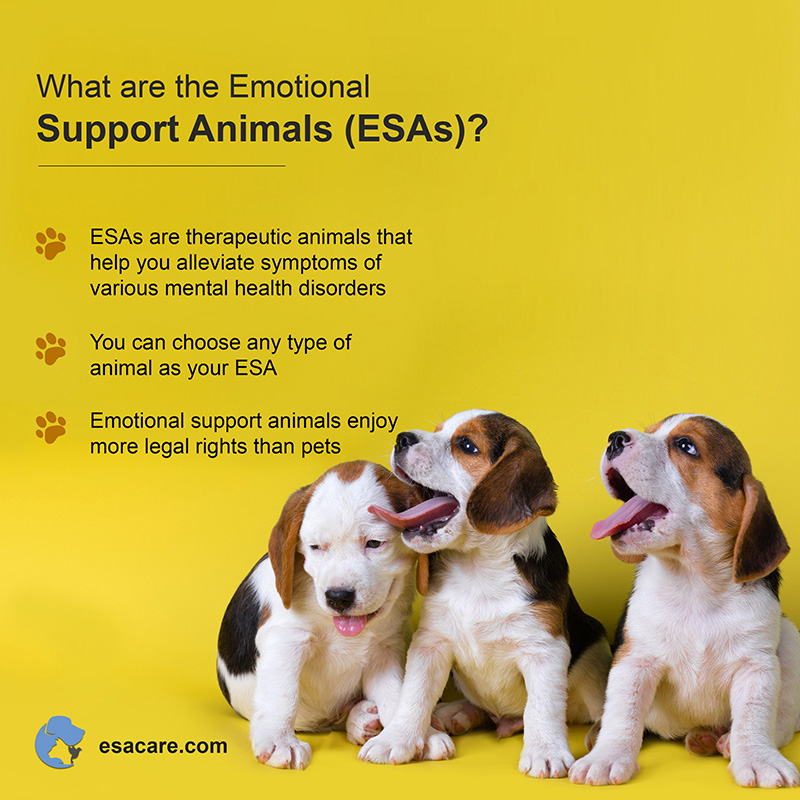Benefits of Emotional Support Animals
Emotional Support Animals (ESAs) have gained significant recognition in recent years for their ability to provide comfort, companionship, and support to individuals dealing with various mental health conditions. In this article, we will explore the numerous benefits of having an emotional support animal and how they can positively impact the lives of their owners.
Reduced Anxiety and Stress
One of the primary benefits of emotional support animals is their ability to reduce anxiety and stress levels in their owners. Studies have shown that interactions with animals can release oxytocin, a hormone that promotes feelings of happiness and relaxation. The presence of an ESA can help individuals feel more calm and at ease, especially during challenging or overwhelming situations.
Improved Mental Health
Emotional support animals can have a profound impact on the mental health of their owners. They provide unconditional love, companionship, and a sense of purpose, which can help alleviate symptoms of depression and loneliness. The responsibility of caring for an ESA can also provide structure and routine, which are crucial for individuals struggling with mental health conditions.
Enhanced Socialization
Individuals with mental health conditions often face challenges when it comes to socializing and forming connections with others. Emotional support animals can act as social facilitators, breaking down barriers and making it easier for their owners to engage in social interactions. The presence of an ESA can serve as a conversation starter and provide a sense of comfort in social settings.

Physical Health Benefits
Aside from improving mental health, emotional support animals can also have positive effects on physical well-being. Regular interaction and physical activities with ESAs, such as walking or playing, can promote exercise and help individuals lead a more active lifestyle. This can lead to improved cardiovascular health, reduced blood pressure, and overall better physical fitness.
Assistance with Coping Mechanisms
Emotional support animals often serve as valuable coping mechanisms for individuals dealing with mental health conditions. Their presence can help distract from negative thoughts or intrusive emotions, providing a source of comfort and support. The act of petting or cuddling an ESA can release endorphins, which are natural mood boosters, further aiding in coping with stress and anxiety.
Legal Protections and Accommodations
Another significant benefit of emotional support animals is the legal protections and accommodations they provide. In many countries, including the United States, ESAs are recognized as a reasonable accommodation under the Fair Housing Act and the Air Carrier Access Act. This means that individuals with ESAs are entitled to housing and air travel accommodations, even in places with no-pet policies.
FAQs about the benefits of emotional support animals
1. What is an emotional support animal (ESA)?
An emotional support animal (ESA) is a companion animal that provides therapeutic support to individuals with mental or emotional disabilities.
2. How can an emotional support animal benefit me?
Emotional support animals can provide comfort, companionship, and a sense of security. They can help alleviate symptoms of anxiety, depression, and other mental health conditions.
3. Do emotional support animals have legal protections?
Yes, emotional support animals are protected under the Fair Housing Act (FHA) and the Air Carrier Access Act (ACAA) in the United States. These laws allow individuals with ESAs to have housing and travel accommodations.
4. Do I need a specific type of animal to be my emotional support animal?
No, any domesticated animal can be an emotional support animal. Common choices include dogs, cats, rabbits, and birds.
5. How do I qualify for an emotional support animal?
To qualify for an emotional support animal, you need to have a diagnosed mental or emotional disability certified by a licensed mental health professional.
6. Can I have more than one emotional support animal?
Yes, depending on your needs and the recommendations of your mental health professional, you may have more than one emotional support animal.
7. Can emotional support animals accompany me in public places?
Emotional support animals do not have the same public access rights as service animals. However, they may be allowed in certain places with prior permission or if they meet specific requirements.
8. Can I get an emotional support animal if I live in a rented apartment?
Yes, under the Fair Housing Act, individuals with emotional support animals are entitled to reasonable accommodation in housing, even if there are pet restrictions or no-pet policies.
9. How can I register my emotional support animal?
There is no official registration process for emotional support animals. However, you may obtain an ESA letter from a licensed mental health professional that verifies your need for an emotional support animal.
10. Are emotional support animals the same as service animals?
No, emotional support animals and service animals have different roles and legal protections. Service animals are specifically trained to perform tasks for individuals with disabilities, while emotional support animals provide comfort and support.
Emotional support animals offer a wide range of benefits for individuals struggling with mental health conditions. From reducing anxiety and stress to improving overall mental and physical well-being, these animals play a vital role in providing comfort, companionship, and support. If you are considering an emotional support animal, it is essential to consult with a healthcare professional and explore the legal requirements and responsibilities associated with owning an ESA.




